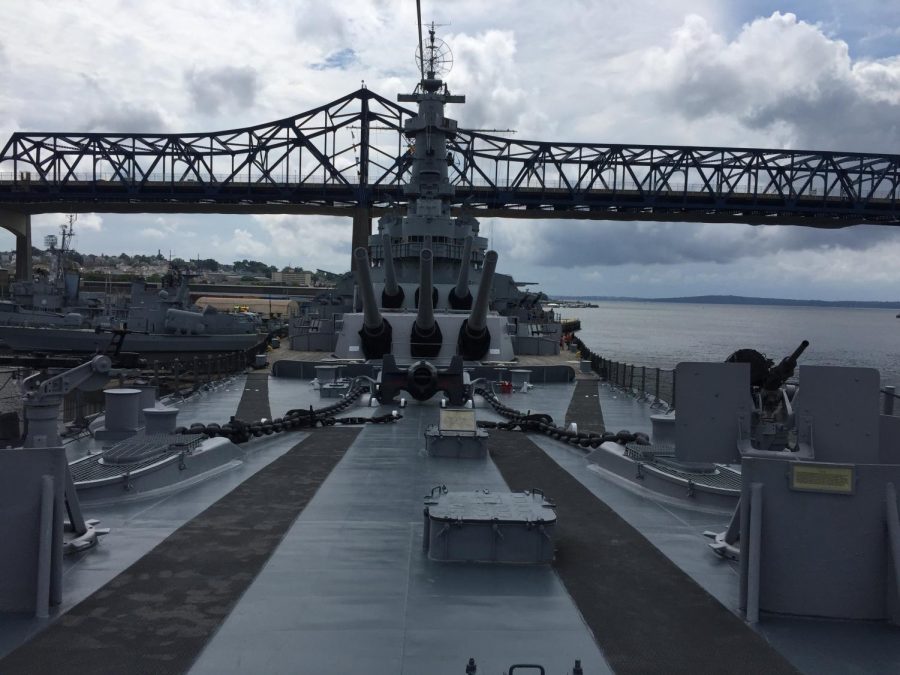America’s Maritime Edge in Trouble
The WWII battleship USS Massachusetts, built at the height of American naval power.
August 24, 2021
The United States is faced with a serious problem, its maritime industry and prowess is a sinking ship.
In the 20th century, the United States of America led the world in shipbuilding and fielded a navy and merchant marine unrivaled by any other. During WWII, U.S. shipyards pumped out ship after ship of varying types, ranging from the hundreds of Victory and Liberty cargo vessels that ferried troops and supplies overseas to the 24 Essex-class aircraft carriers that launched swarms of aircraft to the dozens of submarines that ravaged enemy supply lines. However, those days are long over.
According to an article by Defense News, the maritime industry, and with it the US Navy, have not escaped America’s decline as a leader in industry. Many naval vessels are backlogged for repairs because of insufficient space in dockyards. New warships, such as the Gerald R. Ford-class aircraft carriers are suffering both massive cost overruns and building delays, and that’s before the ship even hits the water. Gerald R. Fords have had issues with weapons elevators (the platforms that carry missiles and bombs to aircraft on the flight deck), the toilet systems are also not very reliable, with sailors having to relieve themselves in empty water bottles. The Gerald R. Ford-class is also not the only example. As stated in another article by Defense News, the Zumwalt-class stealth destroyer was supposed to be produced with over 30 examples. It had to be stopped at three due to the ammunition for its new guns costing over $800,000 per shell. For comparison a Tomahawk cruise-missile costs around $1 million and is a far more capable asset.
However, it is not just the Navy’s fleet that has been in decline. The civilian sector has suffered greatly as well. Due to government-overregulation making it too expensive to operate ships in the United States compared to other countries, the once mighty U.S. Merchant Marine has shrunk to a measly 182 vessels according to the Department of Transportation. This is puny compared to the Merchant Marine in 1960, which fielded 2,926 vessels. In a day where air travel is common, this might not seem like a big problem, however 90% of the world’s cargo is transported by ship. The U.S. Army relies on cargo vessels to transport heavy pieces of equipment such as tanks since transporting them by air would be inefficient. And this problem could not come at a worse time.
The Chinese Communist Party, America’s principal adversary on the world stage, has made China the world’s largest producer of ships. With the Communist Party pouring billions into Chinese shipyards, dockyards across the country churn out ships at a rate the United States cannot currently match. The People’s Liberation Army Navy (what the Communist Party actually calls their navy) is the world’s largest, with hundreds of modern warships. It possesses the hallmarks of a world class fleet, such as aircraft carriers, guided-missile destroyers and ballistic-missile submarines, all of which are now able to travel greater distances thanks to ports built in foreign countries by Chinese economic interests.
So, how can we turn this trend around? Americans must petition Congress (who controls the government’s budget) to invest more into America’s maritime industry in order to allow for the production of new ships. In addition, high schools such as Vandegrift should give greater attention to maritime academies. Maritime academies are specialized schools that prepare their students for service in the Navy, Coast Guard, Merchant Marine and other maritime organizations. There are several academies and one of them, A&M Galveston, is located here in Texas. It has small class-sizes, a former naval vessel to use as a training ship and is located in a very cool town, all things that would likely draw more students if more people knew about it. I had previously just thought it was a smaller version of A&M’s main campus in College Station until I learned that it was a dedicated maritime academy. I am quite sure many Vandegrift students, if they knew more about the school, would be interested in attending it.
If America is to reclaim its status as the world’s superpower, it first must regrow the maritime traditions that have safeguarded the nation since the Revolutionary War. If Americans don’t, the United States will founder as a nation.







